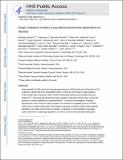| dc.contributor.author | Romero, Rodrigo | |
| dc.contributor.author | Sánchez-Rivera, Francisco J | |
| dc.contributor.author | Westcott, Peter MK | |
| dc.contributor.author | Mercer, Kim L | |
| dc.contributor.author | Bhutkar, Arjun | |
| dc.contributor.author | Muir, Alexander | |
| dc.contributor.author | González Robles, Tania J | |
| dc.contributor.author | Lamboy Rodríguez, Swanny | |
| dc.contributor.author | Liao, Laura Z | |
| dc.contributor.author | Ng, Sheng Rong | |
| dc.contributor.author | Li, Leanne | |
| dc.contributor.author | Colón, Caterina I | |
| dc.contributor.author | Naranjo, Santiago | |
| dc.contributor.author | Beytagh, Mary Clare | |
| dc.contributor.author | Lewis, Caroline A | |
| dc.contributor.author | Hsu, Peggy P | |
| dc.contributor.author | Bronson, Roderick T | |
| dc.contributor.author | Vander Heiden, Matthew G | |
| dc.contributor.author | Jacks, Tyler | |
| dc.date.accessioned | 2021-10-25T18:57:39Z | |
| dc.date.available | 2021-10-25T18:57:39Z | |
| dc.date.issued | 2020 | |
| dc.identifier.uri | https://hdl.handle.net/1721.1/133110 | |
| dc.description.abstract | © 2020, The Author(s), under exclusive licence to Springer Nature America, Inc. Approximately 20–30% of human lung adenocarcinomas (LUADs) harbor mutations in Kelch-like ECH-associated protein 1 (KEAP1) that hyperactivate the nuclear factor, erythroid 2-like 2 (NFE2L2) antioxidant program. We previously showed that Kras-driven Keap1-mutant LUAD is highly aggressive and dependent on glutaminolysis. Here we performed a druggable genome CRISPR screen and uncovered a Keap1-mutant-specific dependency on solute carrier family 33 member 1 (Slc33a1), as well as several functionally related genes associated with the unfolded protein response. Genetic and biochemical experiments using mouse and human Keap1-mutant tumor lines, as well as preclinical genetically engineered mouse models, validate Slc33a1 as a robust Keap1-mutant-specific dependency. Furthermore, unbiased genome-wide CRISPR screening identified additional genes related to Slc33a1 dependency. Overall, our study provides a rationale for stratification of patients harboring KEAP1-mutant or NRF2-hyperactivated tumors as likely responders to targeted SLC33A1 inhibition and underscores the value of integrating functional genetic approaches with genetically engineered mouse models to identify and validate genotype-specific therapeutic targets. | en_US |
| dc.language.iso | en | |
| dc.publisher | Springer Science and Business Media LLC | en_US |
| dc.relation.isversionof | 10.1038/S43018-020-0071-1 | en_US |
| dc.rights | Article is made available in accordance with the publisher's policy and may be subject to US copyright law. Please refer to the publisher's site for terms of use. | en_US |
| dc.source | PMC | en_US |
| dc.title | Keap1 mutation renders lung adenocarcinomas dependent on Slc33a1 | en_US |
| dc.type | Article | en_US |
| dc.identifier.citation | Romero, Rodrigo, Sánchez-Rivera, Francisco J, Westcott, Peter MK, Mercer, Kim L, Bhutkar, Arjun et al. 2020. "Keap1 mutation renders lung adenocarcinomas dependent on Slc33a1." Nature Cancer, 1 (6). | |
| dc.contributor.department | Koch Institute for Integrative Cancer Research at MIT | |
| dc.contributor.department | Massachusetts Institute of Technology. Department of Biology | |
| dc.relation.journal | Nature Cancer | en_US |
| dc.eprint.version | Author's final manuscript | en_US |
| dc.type.uri | http://purl.org/eprint/type/JournalArticle | en_US |
| eprint.status | http://purl.org/eprint/status/PeerReviewed | en_US |
| dc.date.updated | 2021-08-27T13:05:04Z | |
| dspace.orderedauthors | Romero, R; Sánchez-Rivera, FJ; Westcott, PMK; Mercer, KL; Bhutkar, A; Muir, A; González Robles, TJ; Lamboy Rodríguez, S; Liao, LZ; Ng, SR; Li, L; Colón, CI; Naranjo, S; Beytagh, MC; Lewis, CA; Hsu, PP; Bronson, RT; Vander Heiden, MG; Jacks, T | en_US |
| dspace.date.submission | 2021-08-27T13:05:07Z | |
| mit.journal.volume | 1 | en_US |
| mit.journal.issue | 6 | en_US |
| mit.license | PUBLISHER_POLICY | |
| mit.metadata.status | Authority Work and Publication Information Needed | en_US |
